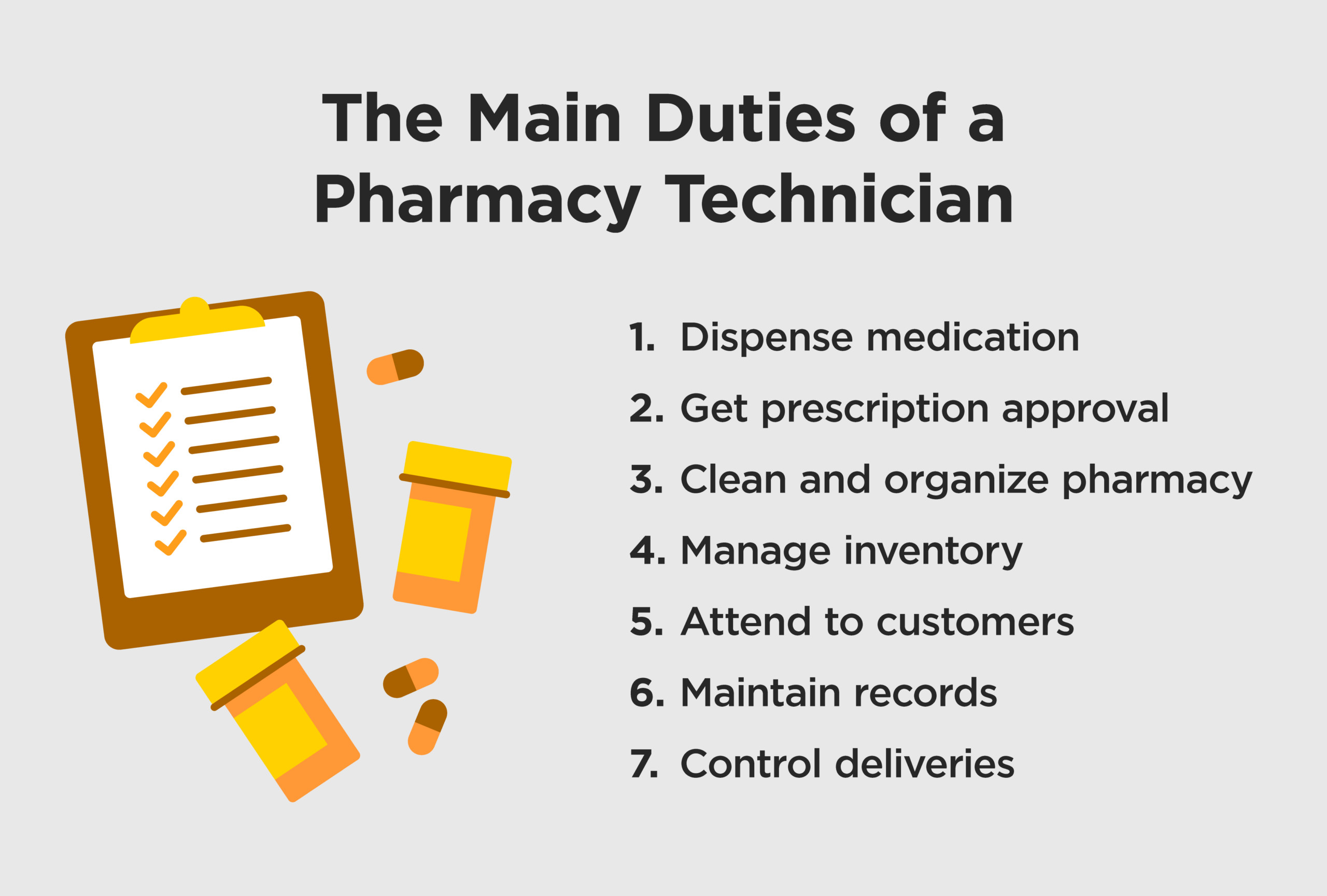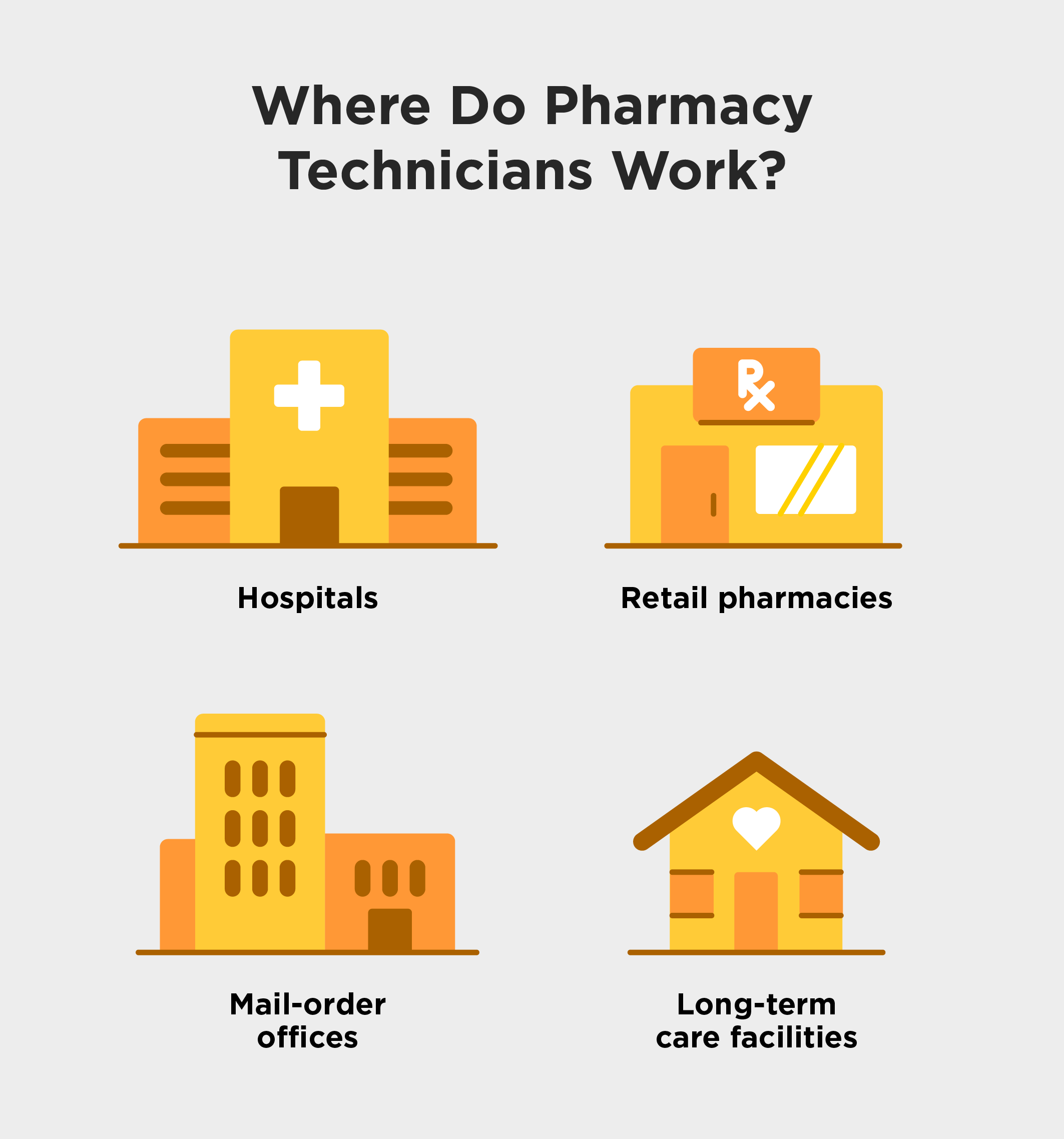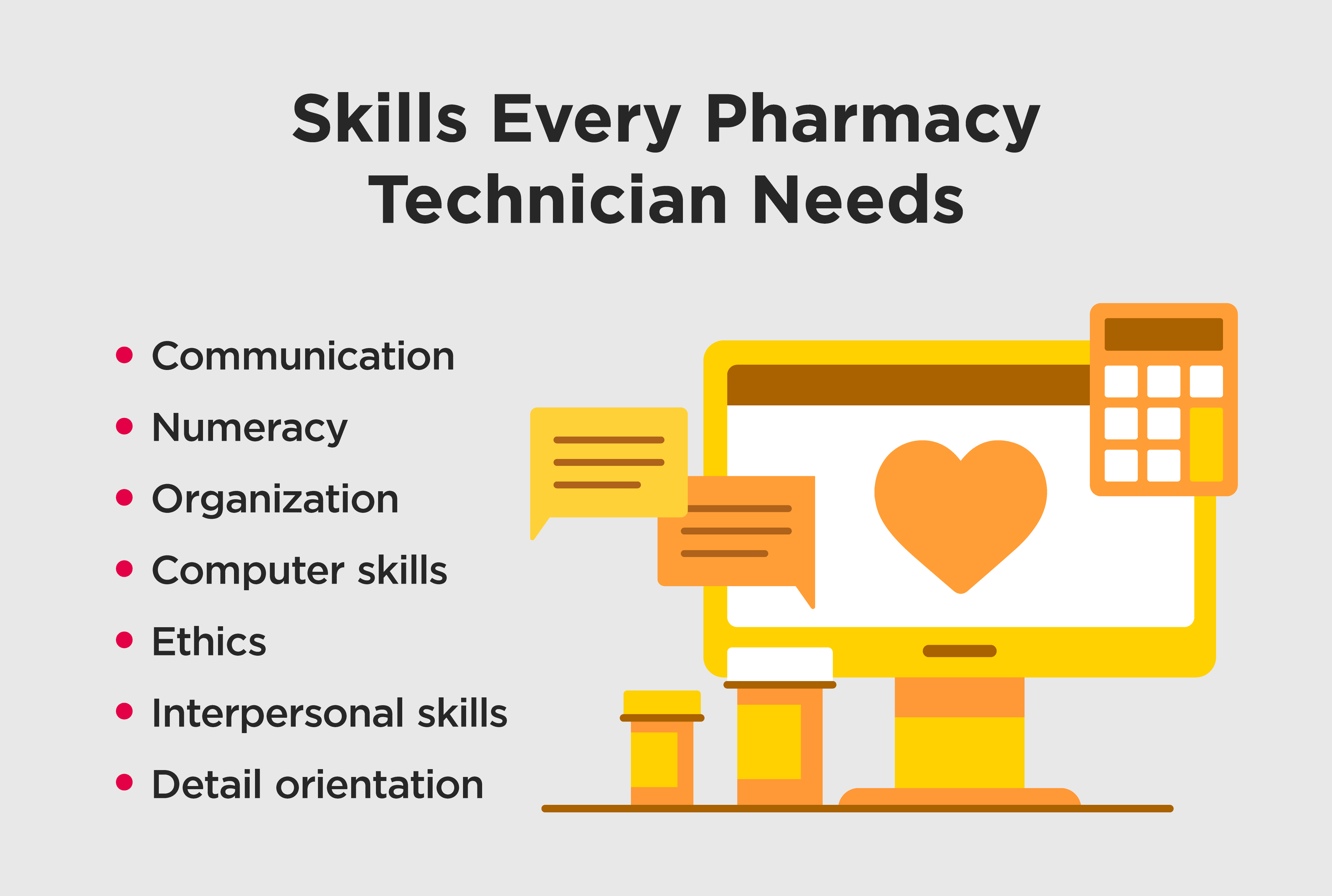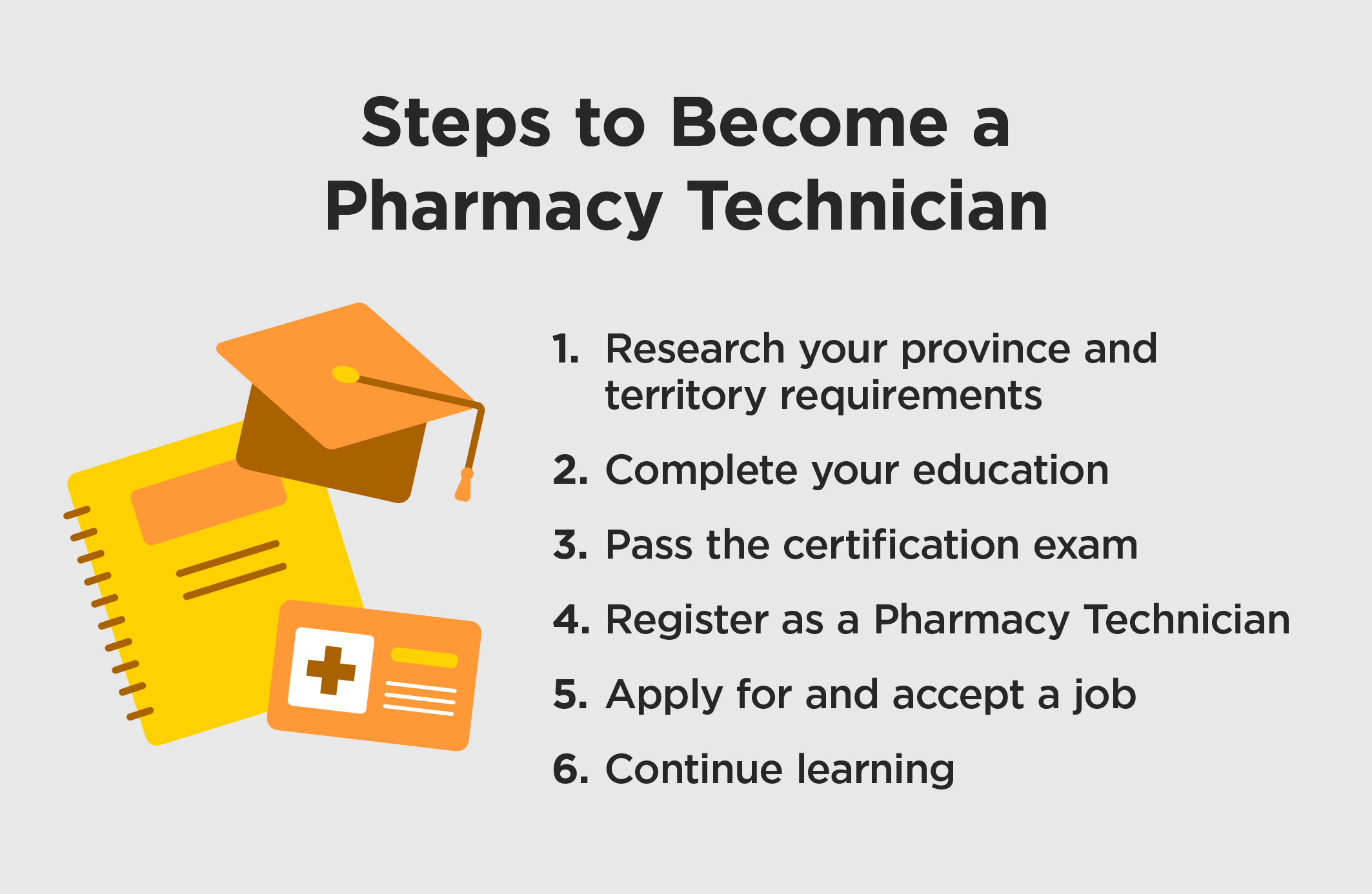What Does a Pharmacy Technician Do? Duties, Skills, and Salary

quick answer
A Pharmacy Technician is a medical professional who works alongside a pharmacist to help fill prescriptions, as well as manage the pharmacy, ensure appropriate stocking, maintain records, and more.
In This Article
The friendly face at the front counter of your pharmacy is most likely not a Pharmacist or a Cashier but a Pharmacy Technician. So, what exactly does a Pharmacy Technician do?
Pharmacy Technicians are an important part of the medical system, helping to fill prescriptions, greet customers, manage patient records, order inventory, and more. According to staffing agency Randstad Pharmacy Technician is one of the top in-demand jobs in Canada for 2024.
Keep reading to learn more about the responsibilities of a Pharmacy Technician, how to become one, and how to see if it’s the right fit for you.
The role of a Pharmacy Technician can change depending on the work setting, but in broad terms, they dispense prescription drugs and other medical devices for patients to use, perform administrative duties, and review prescription requests with doctors’ offices and insurance companies.
When working as a Pharmacy Technician, you have the chance to work in many different types of pharmacy environments. From working behind the counter at a drugstore, grocery store pharmacy, or long-term care facility to pharmaceutical manufacturers, insurance companies, nursing homes, hospitals, and even government positions, there’s a wide variety of options.
Pharmacy Technicians are responsible for a variety of general tasks, including:

Pharmacy Technicians have a wide range of responsibilities, which vary day-to-day and depending on their specific pharmacy. From administrative tasks to dispensing medication and customer service, there’s a lot to do in a pharmacy. Here are some of the main duties of a Pharmacy Technician.
One of the primary responsibilities of a Pharmacy Technician is dispensing medication. Under the Pharmacist’s supervision, the Technician:
Dispensing medication can even include mixing it. For example, if a patient is prescribed a gel, the Pharmacy Technician prepares it. This includes locating the ingredients, verifying the ingredients and amounts with the Pharmacist, and then mixing the substance.
When a customer comes for their prescription pick up, it is the Pharmacy Technician’s responsibility to make sure all prescriptions are reviewed and approved by the Pharmacist on duty. This is for customer safety and is a very important part of the process. The Pharmacist will ensure that the prescription and dosage are correct and review any existing medications to confirm that there are no drug interactions the patient should be aware of.
If the Pharmacist flags any issues, either the Pharmacist or the Technician will be responsible for calling the prescribing Doctor to confirm the prescription before filling.
Keeping the pharmacy clean and orderly falls under the Pharmacy Technician’s list of responsibilities. This includes keeping shelves stocked and tidy, removing any garbage, recycling, or other messes, and organizing the repair or replacement of broken or worn-out materials.
This type of organization can feel like a big undertaking on top of all their other duties. That’s why it’s so critical for the Technician to have excellent organizational skills. Whether that means creating to-do lists or establishing routines, they should find an organization method that works best for them to stay on top of tasks.
Another critical aspect of a Pharmacy Technician’s role is managing and keeping track of the stock of supplies and medication. Having sufficient inventory is very important, especially when, in most cases, customers need their prescriptions filled the same day, or they risk missing doses.
The Pharmacy Technician handles ordering medications and any other supplies the pharmacy needs, such as containers and labels.
The Pharmacy Technician is often the face of the pharmacy, greeting customers, communicating with them, and taking payments. Because of this, customer service skills are an extremely valuable asset for anyone considering becoming a Pharmacy Technician.
In many instances, Pharmacy Technicians work in places like drug or grocery stores, where customers at the counter won’t only be fulfilling a prescription. They may have a question about where to find a product, ask about over-the-counter recommendations, or want to check out at the register with other items from the store. The Pharmacy Tech should be ready and able to help meet any of the customer’s needs.
Good record-keeping is an integral part of being a Pharmacy Technician. From patient files and insurance and supplier information to inventory and sales records, it all falls under the Pharmacy Technician’s purview. Many pharmacies use software to manage all of their records, but some may still keep hard-copy records as well.
Pharmacy Technicians also need to keep their records secure, as they include confidential information about patients’ medical history and insurance details. A good Pharmacy Technician is detail-oriented and takes pride in their organizational skills.
The Pharmacy Technician handles deliveries, ensuring the contents are in good condition and were stored properly during shipment. They also keep a record of all deliveries as part of their record maintenance. For pharmacies that ship to customers, the Technician is also responsible for handling those direct shipments, ensuring the drugs are stored and shipped safely.

Pharmacy Technicians can work across several locations, depending on their interests. Some roles may require more public-facing interactions, whereas others are more behind the scenes. For example:
So, how much does a Pharmacy Technician make? Of course, it depends on where they work, as a public hospital versus a private drugstore will have different wages, as well as variances from province to province.
The average salary of a Pharmacy Technician in Canada is an hourly wage of $26.11, or $50,708 per year.

Many skills will lead to a successful career as a Pharmacy Technician. An aptitude for science and math is important, but so is the ability to communicate clearly and effectively. Here are the top Pharmacy Technician skills.
Strong written and verbal communication skills for health care professionals could mean the difference between patients taking medications properly and misunderstandings with potentially serious consequences.
As a Pharmacy Technician, you’re also required to adapt your communication to meet the needs of different audiences. For example, you must have a clear understanding of the technical terms used to communicate with Pharmacists and other Technicians and the ability to adapt this language into laypersons’ terms for patients.
While math may be a dreaded subject matter for many students, it’s an important component of quality Pharmacy Technician training and a skill that will inevitably be used daily in your prospective workplace. This includes some of the key Pharmacy Technician skills, like converting various measurements and rationing medications.
The environment in which Pharmacy Technicians work is generally quite fast-paced, so it’s essential you maintain exceptional organizational skills in your job.
This may sound straightforward, but with numerous tasks arising throughout any given day, it can be challenging to ensure medications are dispensed properly at the right dosages and to the right patients or that doctor’s offices are faxed to guarantee patients receive important prescriptions on time.
Your ability to stay organized is a key tool within this career and one that will help you stand out as a focused and dedicated worker.
Pharmacy Technicians use specific programs to keep track of important information, such as patient history, current patient prescriptions, and details regarding the composition of specific medications. Pharmacy Technician education will likely teach you how to use these health systems and programs.
Ethics are critical to ensuring trust and credibility within the industry. Pharmacy Technicians should know and understand the legislation that governs the practice of pharmacy as well as the Code of Ethics for their region’s Pharmacist governing body. A strong commitment to ethics will work toward decreasing the circulation of illegal prescriptions in Canada and prescription drug abuse as a whole.
Dealing with the public can be challenging, especially when handling sensitive materials such as medication. On occasion, Pharmacy Technicians may deal with difficult or disgruntled patients who are frustrated about not being able to access a prescription for whatever reason.
In these types of situations, the ability to stay composed and remain polite will set you apart from many professionals in the customer relations industry. A great way to demonstrate patience to exasperated pharmacy visitors is to express that you understand their frustrations and are working toward a solution. This type of communication will help put the guest at ease and enable them to see you care about their concerns.
Being detail-oriented can be crucial to success if you’re considering a career as a Pharmacy Technician. You will be required to perform a number of highly technical duties throughout your work day, such as sterilizing work environments, recording medication stocks, and dispensing prescriptions to patients. If you enjoy these types of tasks, then a career as a Pharmacy Technician may make sense for you.

The first thing you need to become a Pharmacy Technician is an interest in the field. Since this health care job is highly technical and involves customer service, you must be detail-oriented and care about the well-being of people. Here are the next steps to become a Pharmacy Technician.
Pharmacy Technician programs can be found in most major cities across Canada. The right program for you depends on several factors, such as:
Any reputable program will have all of these details on its website, along with specific information regarding the topic units instructed throughout the course. You’ll want to ensure that the program you choose has all of the required courses for a Pharmacy Technician where you intend to work.
In Canada, it usually takes between one and two years to become a Pharmacy Technician, and you must receive training from a program that is accredited by the Canadian Council for Accreditation of Pharmacy Program. Pharmacy Technician programs usually consist of the following:
One of the many exciting prospects of a career as a Pharmacy Technician is that you will have the opportunity to work in a number of settings, including hospitals, big-box retail stores, community pharmacies, and even prisons.
Typically, work placements for Pharmacy Technicians will take place in at least one of these settings and provide students with the opportunity to learn from practicing pharmacists and Pharmacy Technicians. This is also a great opportunity to establish yourself within the industry and form important connections with other health care professionals.
After you complete your schooling, you will be required to pass the Pharmacy Examining Board of Canada (PEBC) Qualifying Exam. Successful passing of the exam demonstrates to prospective employers that you have the necessary skills required to perform the duties of a Pharmacy Technician.
In order to begin your job search, you must first register as a Pharmacy Technician. You should always confirm what the requirements are for your specific province, but completing a Canadian Council for Accreditation of Pharmacy Program and passing the PEBC qualifying exam is generally all that’s required to register as a Pharmacy Technician in Canada.
The good news for graduates of Pharmacy Technician programs is that their skill sets are in high demand across the country. The Pharmacy Technician program you complete should have resources to help you find work within your industry once you graduate. You might also consider volunteering or interning if you’re unable to find a Pharmacy Technician role in your desired area.
You’ll want to make sure you’re prepared for your job search by updating your resume format with your new credentials and certification. You’ll also want to prepare for your job interview and know what interview questions to expect. This means researching your potential employer and ensuring you understand the role and what they need from an employee.
An important part of any role is investing time in continuous learning and development. This is particularly true for jobs in the medical field, where there are continual changes and developments in research and processes.
Stay up-to-date by reading Pharmacy Technician blogs, grabbing coffee with a respected member of your industry, attending health care lectures that may apply to your work, or even registering for a course to improve your credentials.
Pursuing new learning opportunities is a great way to demonstrate your commitment to your career and to avoid complacency within your day-to-day responsibilities. Make sure you let your supervising Pharmacist know you’re interested in career learning opportunities — they may be able to provide you with helpful resources.
As customers at a pharmacy, we don’t get to go behind the counter when we pick up our prescriptions. Someone hands our prescriptions to us, maybe they will go through the side effects, and then we’re off. But there is so much more than that. There is a lot of hard work that goes on behind the counter, and a lot of the work is done by Pharmacy Technicians.
As a Pharmacy Technician, your day may start at 8 or 9 a.m. The start time of your shift will depend on where you work. Most pharmacies open at 8 or 9 and will stay open anywhere from 5 to 10 p.m. The great thing about pharmacies is that you can choose from different locations with a variety of hours. You can work at a 24-hour pharmacy, or you can choose to work somewhere with set hours of your liking.
Once you’re at work, customers will start to come in. You will start the day by greeting the customers and seeing what they’re there for. This interaction typically consists of you pulling up their patient file (or creating a new one if they are a new customer) and double-checking that they haven’t moved and if they have any new information that would be important to add to their file.
After you fill out their information, you will check with the Pharmacist or look on the computer and let them know how long it will be until they can pick up their prescription.
In addition to receiving prescription orders throughout the day, you may also have to check customers’ insurance eligibility and coverage before you move forward. When you are working in a digital format, you’ll likely see the patient information right in front of you.
Once you see that all of their information is correct, you will submit it to their insurance company for payment. This is done electronically, and every single pharmacy will have different systems in place. You will also help fill prescriptions, receive shipments, tidy and organize the pharmacy, and help manage any other tasks that may come up during your shift.
If you’re interested in working in a pharmacy but aren’t sure if a Pharmacy Technician is the right fit for you, here are some other roles you might consider when trying to decide what to go to college for:
You may also consider advancing your career by pursuing other opportunities in the field, such as:
There are several things to consider when deciding if a career as a Pharmacy Technician is right for you. Here are answers to some frequently asked questions.
Pharmacists will have a much more in-depth understanding of medications and anatomy. Additionally, Pharmacists take on more of a leadership role in a pharmacy, with some even being the main owners and operators. Pharmacy Technicians go to school for one to two years, whereas it takes an average of five years to become a Pharmacist.
Yes, a Pharmacy Technician is required to have several different skills, such as customer service, numeracy, and organization, while also having a good understanding of medications, dosages, and drug interactions.
Yes, a Pharmacy Technician is a good career for many reasons. Many Pharmacy Technician positions allow flexible scheduling, advancement opportunities, and ideal working conditions in a social work environment. A career as a Pharmacy Technician is also great for highly detail-oriented people.
Pharmacy Technicians can work in various settings, such as drug or grocery stores, hospitals, long-term care facilities, and even prisons. Those with their Pharmacy Technician diploma may also consider careers in management, pharmaceuticals, or pharmacy technology.
So, what does a Pharmacy Technician do, and is it the right career for you? If you have an interest in medicine, are detail-oriented, and like to help people, then you might make a great Pharmacy Tech. Learn more about Robertson College’s Pharmacy Technician diploma program and get started in a rewarding career in the medical field.
Reach out directly to Robertson College for more information about our programs and unique approach to education.
In This Article
Once you take the first step, one of our Student Admissions Advisors will get in touch to better understand your goals for the future.
Apply Now